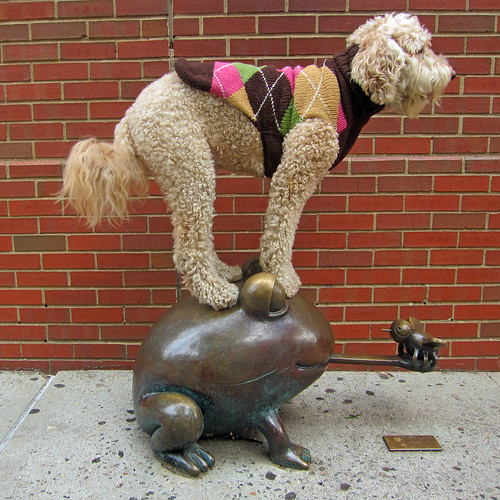It’s that time again, folks, in which we bring the highlights from our favorite language blogs and the latest in word news.
At Language Log, Mark Liberman questioned the recent use of flash mob to mean “impromptu gangs of teens who converge suddenly to rob stores or attack passers-by,” instead of its original reference to “groups of hipsters who (used to?) use social media to arrange impromptu public gatherings with frivolous goals.” Geoffrey K. Pullum railed against historian David Starkey’s assertion that Jamaican patois as a language is “wholly false” and “has been intruded in England, and that is why so many of us have this sense of literally a foreign country.” Pullum said it best: “What a moron.”
In another response to Starkey’s “amazingly ignorant ravings,” Arnold Zwicky brought us a letter from Peter Trudgill, Honorary Professor of Sociolinguistics at the University of East Anglia in Norwich, who pointed out that Mr. Starkey himself:
used a form of language which was distressingly alien. I estimate that at least 40%, and quite possibly more, of his vocabulary consisted of utterly foreign words forced on us by a wholly other culture – words which were intruded in England from the language of Norman French immigrants to our country, such as “language” and “false”.
Language Log also asked that you please wait outside the “rice-flour noodle,” and examined political speech fillers; teaching animals sign language; and unpermitted permitted loads. In addition, they questioned Kim Kardashian’s intellectual property.
At Macmillan Dictionary blog, Stan Carey wrote about finding the “riot” words, while Michael Rundell posted part one of his piece on political correctness. Stan Carey also wrote about fashionable ambiguity (how indecent!), and Fritinancy noted another fashionable trend, “adverbish domains.”
Fritinancy’s word of the week was skive, “to split or cut (leather, rubber, etc.); to shave or pare (hides)”; our own Erin McKean noted fear gauge, prayer-palooza, super-committee, and ack-soy (What did the meat eater say when he wrongly ordered the vegatarian dish? “Ack! Soy!”) in The Wall Street Journal; and Lynneguist explored some spunky American-English and British-English differences.
The Virtual Linguist dissected favour versus favours and words from Pygmalion that were once considered scandalous. The Dialect Blog spoke about the Anglo-Indian dialect, while K International wondered how far one would go to learn another language.
How Stuff Works brought us rap in 30 different languages. In Australia, the New South Wales State Library (we love that their logo is an interrobang) is looking to revive lost indigenous languages, while writer Tim Brookes has kickstarted the Endangered Alphabets Project, which seeks to capture several endangered and disappearing languages through “an exhibition of fourteen carvings and a book.”
Meanwhile, psychologist James Pennebaker spoke to Scientific American about the secret language of pronouns; Science Blog assured us that playing word games is good for the brain; and Headbloom Blog took the temperature of heated language.
In grammar news, writer and copy editor Mark Allen has archived his tweeted language tips; and Guardian Style let us know that yesterday was International Apostrophe Day, to which Stan Carey offered up some classic posts, and The Oatmeal told us how to properly use the apostrophe (now where’d I put my bacon hat?).
Our favorite newly-discovered blog of the week is Quote Investigator, “dedicated to the investigation and tracing of quotations.” Speaking of quotes, there’s a new book about New York City-inspired quotations. Speaking of New York City, there’s a scratch ‘n sniff book on New York City smells. (Since it’s a children’s book, we’re guessing “urine-stained subway” won’t be included.) Speaking of children’s books (last one, we promise), Random House will be publishing several “lost” Dr. Seuss stories, originally printed in Redbook in 1950 and 1951.
Utne showed us this seven-story tower of books in Buenos Aires, which has been designated the 2011 book capital of the world. From Letterology we learned about these alphabetical wonders, while Slate told us about people who became nouns. The New Yorker’s blog, Book Bench, told us about the Pronunciation Book channel and how to (incorrectly) pronounce Ralph Fiennes (how about we just call him You Know Who?). Neil Gaiman spoke at the Edinburgh Book Festival about his new books, Dr. Who, his fans, libraries, and “his character Death.” Salon reported on New York Times book reviewer Michiko Kakutani and a word she really likes.
On a bittersweet note, we bid farewell to Jan Freeman’s language column at The Boston Globe, but are really glad she still has a blog.
Finally, Grammar Monkeys reminds us that “any word can mean anything.”
And to that we say, till next week, chumble spuzz!





